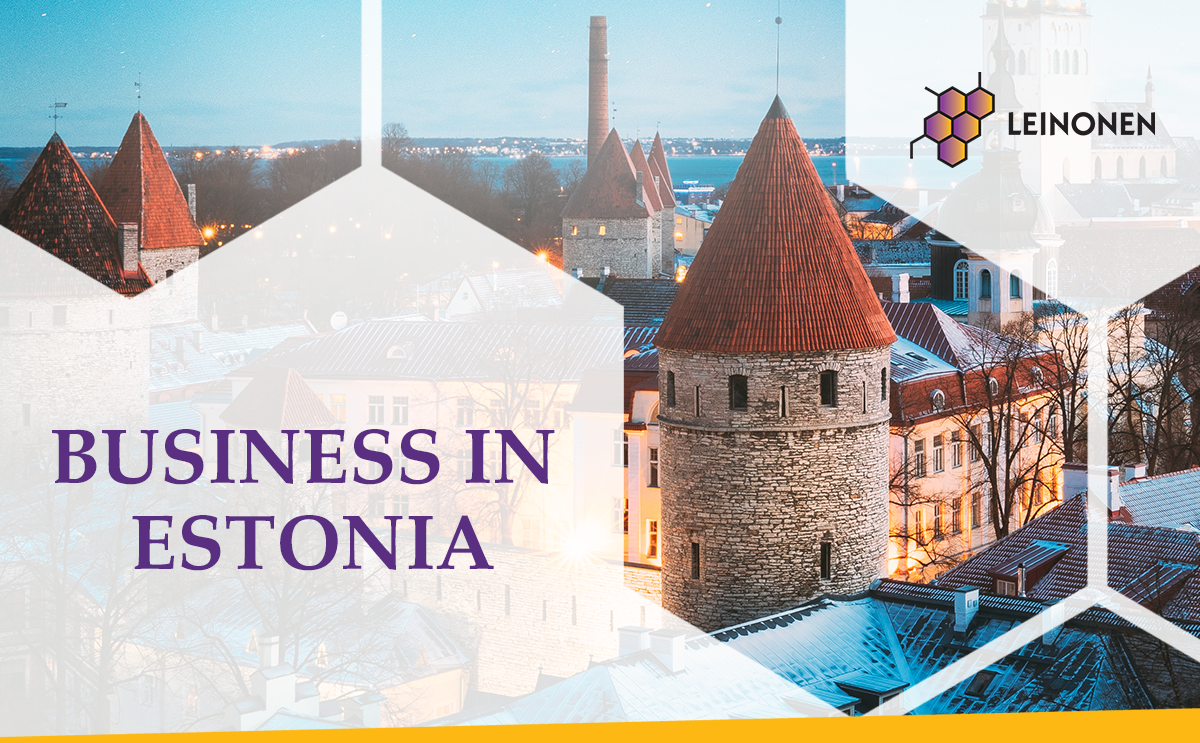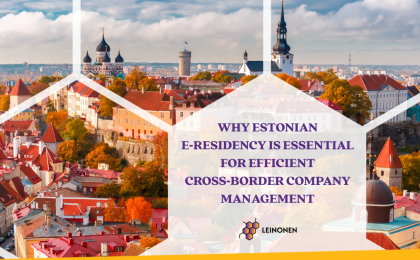Estonian economy has become highly competitive and it supports big international companies as well as newly established start-ups. In recent years Estonia has become the world leader in IT and the country invests highly in the sector.
Estonia has a world-class human capital and its skilled workforce will be a great asset for any entrepreneur who is going to establish a business in Estonia. Estonian workforce is highly qualified and multilingual. English is widely spoken in the country.
Establishing business in Estonia has been made extremely easy. It has become the first country in the world that offers e-residency. This means that entrepreneurs around the world can set up a business in Estonia if they are e-residents. It also allows the entrepreneur to run the business remotely.
COMPANY ESTABLISHMENT
Before undertaking business activity in Estonia, it is necessary to choose which type of legal entity to form. The Commercial Code of Estonia governs business establishment in the country. According to the commercial code, there are five forms of legal entities. These are private limited company (OÜ), public limited company (AS), general partnership (TÜ) and limited partneship (UÜ). The most common forms of business are private limited company and public limited company.
For private limited companies (OÜ) the share capital must be at least 0,01 EUR if there is one founder of the company. Even though the share capital can be only 0,01 EUR, it is highly advisable to establish a company with at least 2,500 EUR share capital.
For public limited companies (AS) the share capital must be at least 25,000 EUR.
Please be noted that the share capital has to be fully paid in before the establishment of the company.
There are two ways to establish a new company in Estonia. The first is the electronic registration through the Company Registration Portal. This option is available only for a natural person who has an e-residency or Estonian ID-card. A natural person- founder has an opportunity to establish a company with no contribution. The second option is registration through a notary.
TAXATION
Due to its relatively low tax rates and lack of corporate income tax on retained and reinvested profits Estonia has one of the most competitive tax systems compared to other countries. To ease business operations all tax declarations can be submitted online.
In Estonia companies are not subject to traditional corporate income tax. Estonian resident companies and the permanent establishments of foreign entities (including branches) are subject to 20%, calculated as 20/80 income tax only in respect to all distributed profits (both actual and deemed) and there is 0% tax on retained and reinvested profits. From January of 2025 income tax rate increases to 22%, calculated as 22/78. From January 1, 2018 until January 1, 2025– the corporate income tax rate on regular profit distributions was lowered from 20% to 14%, but only in cases where dividends are paid to legal persons. The tax period for companies is a month, income tax must be declared and paid by the 10th day of the following month. Personal income tax rate in Estonia is 20%. The period of taxation for personal income tax is one calendar year. Taxation of the income of employees shall generally be performed by withholding income tax at a rate of 20% of the gross salary of the employee. From January 2025 the personal income tax rate increases to 22%. Employers withhold taxes from employees’ gross salary each month, meaning there are no additional payments or filing obligations for the employee. Tax residents of Estonia are liable to declare their worldwide income in Estonia, regardless of the origin of the income. Non-residents are only taxed on the income they earn within Estonia.
From January 2024 standard VAT rate in Estonia is 22%. If an invoice was issued to the purchaser and the goods were dispatched or made available or the service was supplied before 1st of January 2024, until 31st of December 2025 the user of cash accounting of VAT may pay VAT at the rate of 20%. The reduced VAT rate for 9% is applied for books, medical products, periodic publications and accommodation services. From January 2025 the reduced VAT rate for 13% is applied for accommodation services. 0% rate is for all goods and services related to International Business.
For more information regarding the taxation in Estonia, please visit Estonian Tax and Customs Board’s website.
EMPLOYMENT
The core of the Estonian labour relations is regulated by the Estonian Employment Contracts Act (ECA).
Expats are liable to pay resident taxes in Estonia only if they stay in Estonia for at least 183 days over a period of 12 consecutive calendar months. When the foreign employee fulfils the criteria for tax residency in Estonia he/she should register the form of determination of residence.
To employ people for the business in Estonia, it is always necessary to register the employees in the Employment Register that is kept by the Tax and Customs Board. In case the employees do not have an Estonian ID number yet, they must acquire it from the local government.
In case the employer decides to extraordinarily terminate the employment contract with a good reason as prescribed by ECA, the written notice must be given according to the employment period and varies between 15 days for persons with less than a year working period, and 90 days for persons that have worked for over 10 years in a company.
The employee may ordinarily cancel an employment contract entered into for an unspecified term at any time by notifying in a form that can be reproduced at least 30 calendar days in advance.
BEING AN EXPAT
Estonia is a member of the European Union so moving and working inside the EU for the citizens of EU-countries is free. However, if a foreign national wants to stay and work in Estonia more than 90 days a residence permit has to be applied.
The expat community is biggest and liveliest in the capital Tallinn. However, also Tartu hosts a rather big group of foreign students and workers.
More information regarding residency in Estonia, please visit the official website of Estonian Police and Border Guard Board.
INTERESTING FACTS ABOUT ESTONIA
- Estonia was the first country in the world which introduced e-elections.
- Approximately 50% of the Estonian territory is covered in forests.
- Over 40% of people of working age in Estonia have a higher education.
- English is spoken by almost 50% of the Estonian population.
- Estonia has been ranked first in the OECD’s „International Tax Competitiveness Index“ ranking for ten consecutive years.
- Estonian was ranked as the second most beautiful language in the world following Italian.
- University of Tartu is the only university in the Baltics to be in 1.2% of the world’s best universities.
- Estonian Song Festival (in Estonian „Laulupidu“) was first held in 1869 and has been recognized by UNESCO as a masterpiece of the oral and spiritual heritage of mankind.
- There are over 2000 islands in Estonia and the islands have a total of over 40,000 permanent residents.
If you’re interested in starting a company in Estonia, contact our experts for a consultation.




